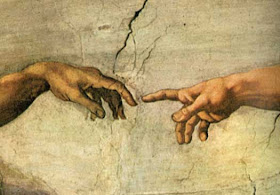 |
| Writers create |
I was tempted to title this article, "Writers: Masters of the Universe," but that wouldn't have been very descriptive. Much cooler though.
I was chatting with a friend this morning over email and she mentioned the necessity of embracing failure, the need to allow oneself to fail in order to have the freedom to create that magical first draft.
I'm not saying the first draft is magical because it's so good (although my friend's probably will be, she's an awesome writer) but because it contains in some form--even if it's a twisted, mangled promissory form--the seeds of a story.
It's the morning and I've only had one cup of coffee which means I need at least two more before I become remotely lucid, but it seems to me that the first draft is an act of creation. A writer starts with nothing, not even an idea. Then the idea appears and grows and transforms and becomes a story, something with a theme and a plot and characters and perhaps narrative drive.
To me, all such acts of creation are magical. Something is being created from nothing, ex nihilo.
Years ago another friend of mine introduced me to the term, "dark art". For instance, wine tasting is a dark art, so is picking a stock that performs well.
A successful day trader is a past master of the dark arts.
The idea behind the term is that sometimes there's no straightforwardly algorithmic way to achieve success in a certain field, or at a certain venture. And yet, somehow, people do and they do it on a regular basis. I think calling such people past masters of a dark art sounds cooler than remarking, "They have what it takes," or "They have je ne sais quoi, but it comes to the same thing.
Although there's no way someone can tell another person how to accomplish something for which there is no algorithmic path to success--that's the whole point after all--there are preconditions; requirements that must be met for success to be possible. In the case of a writer one of these requirements seems to be giving oneself the permission to fail.
I came across this quotation yesterday:
'It is perfectly okay to write garbage – as long as you edit brilliantly,' C . J. CherryhI needed to look that quote up to make sure I remembered it correctly (thanks Ali Hale) and came across this one:
'God sells us all things at the price of the labor,' Leonardo da VinciIt might seem as though I'm contradicting myself. On the one hand, I'm saying writing a first draft is a dark art and, on the other, that going on a Dadaistic writing frenzy is the path to success.
Both are true.
As long as the idea--even the minutest, sickliest, germ of an idea--comes out in your first draft, even if it only tangentially gestures at the potential possibility of an idea, that's your lightning in a bottle.
On successive drafts you can hone the idea, get to know it, craft it, explore it, develop it. Perhaps, ultimately, the idea that eventually becomes the soul of your story will be another one altogether and your first idea will have served to merely show you the way.
I think that's part of the mystery of writing, why we fall in love with it. At heart, writers are drunk with the power of creation.
Or something like that.
Before I have my second cup of coffee I have two operating brain cells and they're locked in a death match, so take all this with a grain of salt.
Thanks for reading and remember Heinlein's first rule: Writers write.
(See what I mean? The title, "Writers: Masters of the Universe," would have been much cooler.)
Related reading:
- Jim Butcher: How To Write A Story
- How to build a Villain, by Jim Butcher
- Jody Hedlund: Talent Is Overrated
- Henry Miller's 11 Writing Commandments
"Writers: In Order To Win We Must Embrace Failure," copyright© 2012 by Karen Woodward.

Good post Karen - I totally agree!
ReplyDeleteThe first draft, in its rawest, purest form, kind of reminds me of the demo recordings of an album. Rough around the edges, but with the potential for brilliance with a bit of tweaking.
The notion of 'ideas' is so intriguing too. What drives us? So fascinating.
Thanks Ryan! I'm glad I made some sense. Love that analogy. Appreciate the comment.
ReplyDelete